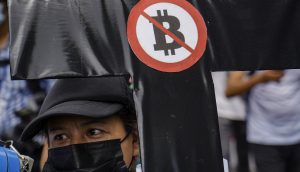At the beginning of the year, things are happening in rapid succession at DekaBank. Within just one week, the Sparkasse credit house announced a partnership for the custody of digital assets and applied for a crypto custody license. For some customers a pointer in the direction of Bitcoin and Co.
In an interview with BTC-ECHO, Marion Spielmann, Head of COO Banking Divisions and Depositary at DekaBank, explains what the crypto strategy looks like, whether Bitcoin has the potential as a currency and why, in her opinion, the cryptocurrency is not a “stable store of value”.
BTC-ECHO: Why did DekaBank apply for a crypto custody license?
Marion Spielmann: We are the securities house of the savings banks. As such, we cover the entire securities value chain from issuance to trading and custody. Blockchain technology will lead to significant changes in the securities business. For our customers and owners, the savings banks, we want to be able to map securities holistically in the digital world as well. This includes crypto custody.
dwpbank already enables all affiliated banks, including their financial institution, to offer their customers Bitcoin. Does this mean that customers will soon be able to buy cryptocurrencies via Deka?
We want to give our customers and owners access to digital assets. We are talking about crypto securities or funds, for example. Cryptocurrencies are currently not one of them. We have made a decision within the Sparkassen organization: We believe that cryptocurrencies are too risky for customers who have a general understanding of financial products.
However, there is also the group of people who make their own decisions, who are better able to assess their risks on their own responsibility and who have a different investment purpose. For example, not for long-term wealth accumulation, but rather for short-term speculative success. Savings banks may allow these customers access via dwpbank. In principle, however, these customers already have the opportunity today, for example via third parties, to claim this market for themselves.
read too
Customers who are interested but don’t know what’s going on then go to unregulated providers. Here, Deka could give the customer an understanding of such risks, right?
If we sell financial products to private customers in Germany, we have to inform and advise our customers according to the law. How to deal with cryptocurrencies in investment advice has not yet been defined. Therefore there is no investment advice in the German market, as we inform the customer about risks and opportunities. The regulatory framework for this was lacking.
Could that change with the upcoming MiCA regulation?
The MiCA provides certain consumer protection regulations for the issuance, exchange, custody and trading of crypto assets. However, there is no detailed information on how to handle the investment advice issue. A regulatory practice must first be developed here. We now have this regulatory framework where banks and providers know what they need to comply with. However, the question remains as to whether there is any demand for cryptocurrencies at all from the typical customer who wants to build up assets for his retirement.
In research”Departure into the new digital worldIt states that bitcoin is not a “stable vehicle” for storing value. However, when comparing the performance of Bitcoin with the euro since 2009, it is noticeable that if you had invested in Bitcoin, the value would have increased. The value of the euro has even decreased due to inflation. So isn’t Bitcoin just that: a store of value?
There is a special situation with inflation. And it always depends on when the investment in Bitcoin takes place. The last two years have seen a lot of capital being wiped out by bitcoin volatility. If I look at central bank money today, the customer has equivalent value and purchasing power despite inflation. The problem with Bitcoin is that it is still not accepted as a means of payment. Also in El Salvador we see that although bitcoin is legal tender, few transactions take place.
read too

Bitcoin is an artificial currency that is not widely accepted. If cryptocurrencies do not break through this status, then they remain uninteresting for many.
Do you see potential for Bitcoin as a working currency in the future?
There’s this big discussion about whether bitcoin is a crisis currency. Due to inflation and the banking crisis, Bitcoin has grown again. How sustainable this increase is depends on whether it is accepted as a means of payment. I have to be able to do something with the bitcoin too.
Incidentally, sustainability is a good keyword, because Bitcoin also has major weaknesses in terms of energy consumption. The proof-of-work consensus mechanism used has a significant power consumption. While this is done to protect the integrity of the blockchain from attackers, this type of consensus building is inefficient. Other consensus mechanisms, such as proof-of-stake and proof-of-authority, use significantly less power.
It is also not a pure store of value cryptocurrency, it is too volatile for that. The cryptocurrency only has a chance if Bitcoin gets this acceptance in the market as a means of payment.
Thank you for the interview.
Do you want to buy cryptocurrencies?
On Bitpanda you can trade over 200 cryptocurrencies as well as precious metals. One platform for both beginners and experienced investors.
The latest issues of BTC-ECHO Magazine
You might also be interested in this
